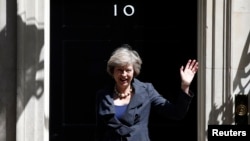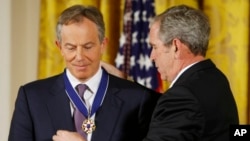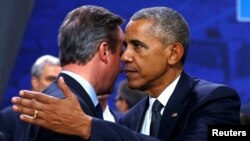One of the first phone calls Theresa May will make as Britain’s new prime minister will be to U.S. President Barack Obama. Earlier this week, a White House spokesman said with May as Britain’s new leader, there was confidence in Washington that the ‘special relationship’ between the two countries would not only be protected but advanced.
That was music to the ears of British media that are always quick to take the temperature of the so-called special relationship and fret at any suspected transatlantic coolness. But past and current British diplomats who talked with VOA on the condition of anonymity aren’t so sure that as Britain shapes its future outside the European Union, the intimate ties between Washington and London that stretch back to World War II will remain as close.
They worry more than ever about their access to Washington power after President Obama’s dire warnings over Brexit in the run-up to last month’s referendum in which he warned Britain would be diminished, if it left the EU and would be at the back of the line behind the Europeans when it comes to negotiating future free trade deals.
“Germany will increasingly become more important,” worries a former British ambassador to the U.S. “Outside the EU, we will be of less importance to Washington - Berlin and Paris more so,” he fears.
Another envoy, currently an ambassador to a European country, says that by exiting the European bloc, Britain has jettisoned one of its key roles as far as Washington is concerned - namely, acting as America’s deputy within the European camp, cajoling and lobbying on behalf of the U.S. That was seen most dramatically in the run-up to the Iraq invasion when then-British Prime Minister Tony Blair backed George W. Bush and rallied European doubters, although he had no luck with the French.
Losing leverage
With the EU developing a common security and foreign policy, “Britain won’t be able to help influence it, reducing our leverage with Washington,” the envoy says. And he argued that last week’s long-awaited Chilcot report with its damning indictment of the reasons the Blair government gave for joining the U.S. in invading Iraq is fueling fears that Britain is in danger of becoming a less dependable ally for the Americans.
“Chilcot will have a chilling effect on future British prime ministers when it comes to joining the U.S. in overseas interventions,” he predicts.
“I will be with you, whatever,” Tony Blair was revealed to have promised Bush in a secret letter sent eight months before the joint invasion.
A major factor in Blair’s decision to offer unequivocal support to Bush was a fear that Britain would lose influence in Washington and damage the special relationship, if it withheld its support for the post-9/11 invasion.
But, unlike when the special relationship was forged in World War II between Winston Churchill and Franklin Roosevelt, Washington was far less ready to accept British political counsel about how to go about garnering international support for the invasion, according to John Chilcot, a former top British civil servant, whose seven-year-long inquiry heaped blame on British politicians, intelligence officials, diplomats and generals for their role in the invasion and subsequent occupation of Iraq.
Seeking a role
The diplomats worry that the 1962 remarks of Dean Acheson, a former U.S. secretary of state, about Britain’s position in the world, will start becoming true, albeit belatedly.
In a speech at West Point, the U.S. military academy - and to the anger of the British media - Acheson said, “Great Britain has lost an empire and has not yet found a role. The attempt to play a separate power role, that is, a role apart from Europe, a role based on a ‘special relationship’ with the United States, a role based on being head of a ‘Commonwealth’ which has no political structure, or unity, or strength - this role is about played out.”
Even before Brexit, the U.S. foreign policy establishment was questioning Britain’s reliability as the go-to-country for support. The 2013 vote by British lawmakers rejecting taking military action against Syrian President Bashar al-Assad's government to deter the use of chemical weapons took Washington aback.
France has been far more active in Africa and the Middle East against jihadists than Britain, note U.S. officials, who, like Obama, are keen now to refer to France as America’s “oldest ally.”
Before arriving in Poland for last week’s NATO summit, Obama sought to reassure Britons. “The special relationship between the U.S. and the UK will endure,” he wrote in the Financial Times.
While no one doubts Britain will remain a key player in transatlantic relations, and an important contributor to European security, few British diplomats appear to think it will be as in the past the key player.
Noticeably, at the NATO summit, U.S. diplomats didn’t schedule any private meetings between President Obama and outgoing Prime Minister David Cameron.














